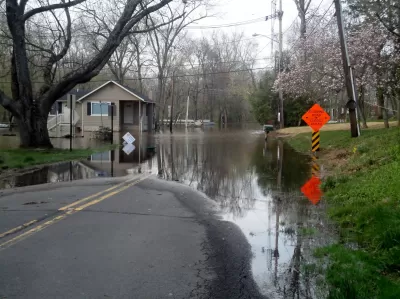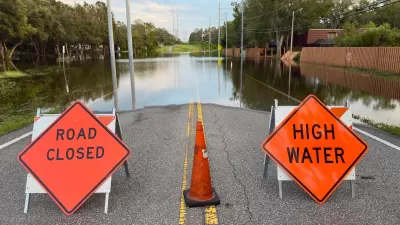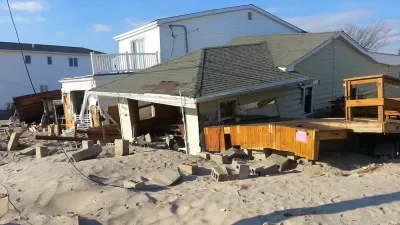As the threat of flooding increases, buyout programs to relocate homeowners are a better alternative to rebuilding—for cities and residents.

John Schwartz reports on buyout programs that pay homeowners to move out of flood-prone areas. Cities can then level homes and turn the land into open space and green infrastructure to help mitigate future flooding impacts.
It is a more cost-effective strategy than rebuilding. "The costs of flooding continue to climb, but only 20 percent of the money that the Federal Emergency Management Agency distributes in disaster grants is earmarked for pre-disaster work, even though research shows that a dollar spent on mitigation before a disaster strikes results in at least six dollars in savings," writes Schwartz.
Over 20 years ago, Nashville started buying homes in hazardous areas, and the city's successful program is a model for planning ahead of flooding disasters. Many residents welcome the option to relocate, but cities executing buyout programs still face an uphill battle with long-term residents or when the financial benefits might not be substantial enough.
"Nicholas Pinter, the associate director of the center for watershed sciences at the University of California, Davis, said the challenges to 'overcoming social inertia' are so high because of 'the intense sense of place that people have,'" notes Schwartz.
FULL STORY: As Floods Keep Coming, Cities Pay Residents to Move

Study: Maui’s Plan to Convert Vacation Rentals to Long-Term Housing Could Cause Nearly $1 Billion Economic Loss
The plan would reduce visitor accommodation by 25,% resulting in 1,900 jobs lost.

Placekeeping: Setting a New Precedent for City Planners
How a preservation-based approach to redevelopment and urban design can prevent displacement and honor legacy communities.

Using Old Oil and Gas Wells for Green Energy Storage
Penn State researchers have found that repurposing abandoned oil and gas wells for geothermal-assisted compressed-air energy storage can boost efficiency, reduce environmental risks, and support clean energy and job transitions.

Washington State Plans Ambitious ‘Cycle Highway’ Network
The state is directing funding to close gaps in its existing bike network and make long-distance trips more accessible.

Homeowners Blame PG&E for Delays in ADU Permits
The utility says it has dramatically reduced its backlog, but applicants say they still face months-long delays for approvals for new electrical work.

Rethinking Wildfire Defense: How a Landscape Approach Can Protect Neighborhoods
Post-fire analysis of the Eaton Fire reveals that a landscape approach — including fire-resistant vegetation, home hardening, and strategic planning — can help reduce wildfire risk, challenging assumptions that trees and plants are primary fire hazards.
Urban Design for Planners 1: Software Tools
This six-course series explores essential urban design concepts using open source software and equips planners with the tools they need to participate fully in the urban design process.
Planning for Universal Design
Learn the tools for implementing Universal Design in planning regulations.
Borough of Carlisle
Caltrans
Heyer Gruel & Associates PA
Institute for Housing and Urban Development Studies (IHS)
City of Grandview
Harvard GSD Executive Education
Salt Lake City
NYU Wagner Graduate School of Public Service
City of Cambridge, Maryland





























